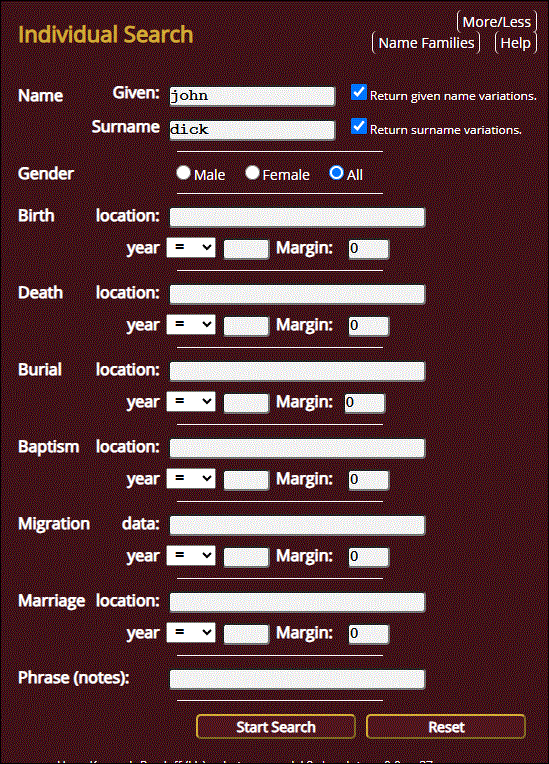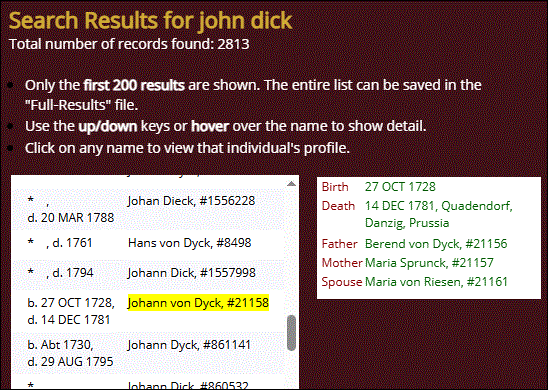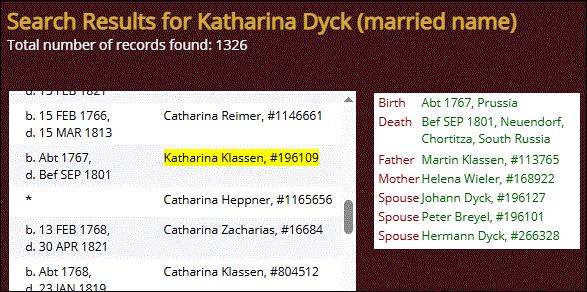|
GRanDMA OnLine
|
|

|
|||||||||||||||
|
New Notification(s) posted |
||||||||||||||||||
|
| |
Help for the Individual Search | |
 The capabilities of the Individual Search and some strategies are described here.
The capabilities of the Individual Search and some strategies are described here.To learn about how the search itself is executed, go to the help page, "Execution of the Individual Search". Search help may also be accessed in the video, "GMOL Searches". The Individual Search form has many more fields into which we can enter search terms compared with the Quick-Search form. Using the "More/Less" button, some infrequently used fields can be hidden. The first thing to remember is that we don't have to fill all of them. The search will use only the fields that we complete. In fact, there is no field that is required. The second thing to remember is that for most of the fields, unlike at Google, the search is exact. If we put in a search parameter that doesn't exist in the database, the search will fail because it didn't find all of the information that we said it had to include. There are many ways to use this form, and we'll explore some. | |
|
Search by Given Name and Surname with the name-variations checkbox(es) checked. Usually, our first step is to enter the first and last names. However, spellings of names have changed over the centuries. We may be uncertain about which one applies or one form of the name is used in one document, and a different form is used for the other. The search is designed to search the variations.  With the checkboxes "checked", any known spelling of John and of Dick will work since the Given Name
and Surname will be converted to a Name Reference Code. Forms of Johann (Johann, John, Hans, Jose, etc.) will
be treated the same, and the search will be based on that code and on the options. If we enter
John and Dick, we will get 2481 results including many different variations of John and Dick. Searching for
"Johann Dyck" will yield the identical result.
With the checkboxes "checked", any known spelling of John and of Dick will work since the Given Name
and Surname will be converted to a Name Reference Code. Forms of Johann (Johann, John, Hans, Jose, etc.) will
be treated the same, and the search will be based on that code and on the options. If we enter
John and Dick, we will get 2481 results including many different variations of John and Dick. Searching for
"Johann Dyck" will yield the identical result.
With that many results, our search will have included our target, but the list is unwieldy. We will want to narrow the search using methods described later. Note that, as of 2025.04, we can decide whether to search the variations for one name and not the other. top | |
 Search by Married Name For a married woman, we might not know the surname at birth.
If we know a woman's married name, we can
enter that name and indicate with a bracket that it is the married name.
Search by Married Name For a married woman, we might not know the surname at birth.
If we know a woman's married name, we can
enter that name and indicate with a bracket that it is the married name. To search by married surname, begin the Surname entry with a { character. Let's say that we are searching for our Johann Dyck's wife, Katharina, but we don't know her birth surname. Then we enter her surname as {Dyck. GMOL will search for persons whose married name is "Dyck" and in that list, we will find a list Katharinas that were married someone with the surname Dick or Dyck, etc. 
top | |
|
Narrowing the search: A search that returns hundreds of results often can be refined to narrow the search so that only a few individuals will be returned. We can use as many fields as we have available information. Usually, but not always, we start by entering the name, but no one field is always required, not even the name. Always keep in mind that if we over-specify, we can end up with no results because the information that we specified might be correct but not in the GRanDMA record. top | |
 Including a date range. Obviously, if we specify the year in a field,
we can dramatically narrow the results. But keep in mind that dates in GRanDMA can easily be off by a year,
especially if they were derived from census or ship records. So, searching for a range is often prudent.
Including a date range. Obviously, if we specify the year in a field,
we can dramatically narrow the results. But keep in mind that dates in GRanDMA can easily be off by a year,
especially if they were derived from census or ship records. So, searching for a range is often prudent.
Returning to our example, if we don't know the birth year, we might make an educated guess, maybe 1853 for Katharina who was actually born in 1852. That search reduce the results from 2481 to 3, but it would not return the one we are looking for. So, we give it a wide margin, maybe 10, for a total of 21 years. That reduces the list from 2481 to 147. top | |
|
Other fields. Any field can be used to narrow the search if used accurately. Locations need to be used with care. They only help if the entry matches the database exactly. For example, if we enter "Lincoln, NE" but the database has "Lincoln, Nebraska" we would not get a match. However, GMOL provides an aid. A list of places that include the part of the name that we type in will be displayed, and we can pick one that does appear in the database somewhere. 
Migration If we use the Migration field, we can search on the destination city name or a ship name or whatever might be in the entry. Again, hints are provided when we enter part of a place name. The Phrase field searches the Notes. The phrase or word must be exactly as it appears in the database. top | |
|
Search by Given Name and Surname with the checkbox un-checked. GMOL will search for names that include the Given Name as entered and the Surname as entered. For "John Dyck," only given names that begin with the letters "John" will be returned. That reduces the result to 106 individuals, far fewer, but still a big pool. Anyway, if we know exactly how the name appears in the database, we can use this option. This search is useful for non-Low German Mennonite names which have no assigned codes. This search can also include middle names which are excluded in other searches unless they are preferred middle names. However, in our example, we thought the given name was "John", but the name in the database actually was "Johann". Our search would have missed it. top | |
 Search by GM number. Every person listed in
the GRanDMA database is assigned a unique number, customarily prefixed by a "#" sign. So if
we already have the GRanDMA number, we enter it in the Surname field and make an exact search. Since the GRanDMA
number is unique to an individual, pressing "Start Search" will take us straight to that profile. Search by GM number. Every person listed in
the GRanDMA database is assigned a unique number, customarily prefixed by a "#" sign. So if
we already have the GRanDMA number, we enter it in the Surname field and make an exact search. Since the GRanDMA
number is unique to an individual, pressing "Start Search" will take us straight to that profile.A different page, the GM Number Search page, may be more efficient for you. It can even verify results before bringing up the full profile. top | |
 Search by Name Reference Code. Low German-Mennonite surnames
(the ones that were in the Mennonite communities of what are now Poland, Ukraine, and Russia) are assigned a 3-character code. Names that are historically the same,
though spelled differently today, are assigned the same code. (We can
look up these equivalents elsewhere.) Similarly, given names are assigned a two-letter code,
and equivalent names (like Gerhard, Georg, and Igor) are assigned the same code. Search by Name Reference Code. Low German-Mennonite surnames
(the ones that were in the Mennonite communities of what are now Poland, Ukraine, and Russia) are assigned a 3-character code. Names that are historically the same,
though spelled differently today, are assigned the same code. (We can
look up these equivalents elsewhere.) Similarly, given names are assigned a two-letter code,
and equivalent names (like Gerhard, Georg, and Igor) are assigned the same code.If this GRanDMA Name Reference Code is known, it can be entered directly. GMOL will display a list of individuals that fit that Name Reference Code. This search can further be narrowed with the Options described below. Probably only experienced users will form this type of search, but if we want to look up these codes, we can use a Name Ref Code Widget. top | |
|
Mining other information. This search form can actually be used for other things besides finding a particular individual. We can ignore the name entry altogether in our searches and mine other information. This can lead to interesting searches. For example, if we leave all the fields blank except to enter "Botswana" for "Birth Location", it will return the 23 people that are listed as born in Botswana. We can find that ten people born in the 1800s in South Russia immigrated through Boston, and 25 came through Galveston. There are many ways to mine data. top | |
|
|
|
Prepared for , 1/21/2026 10:01:21 PM Database: , Mennonite Genealogy, Inc. GRanDMA OnLine website: GMOL v7.6.76; K. L. Ratzlaff ,Lawrence, KS, 11/2000‑1/2026 Database: , Mennonite Genealogy, Inc. GRanDMA OnLine website: GMOL v7.6.76; K. L. Ratzlaff, Lawrence, KS, 11/2000‑1/2026 |